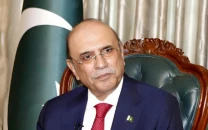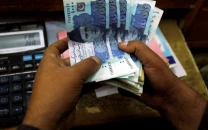Legislation urged to exit electricity deals
Panel of experts warns of system collapse without immediate reforms

Pakistan's former cabinet members, main negotiators of China-Pakistan Economic Corridor energy deals and industrialists have recommended a slew of measures to reduce electricity prices, including by declaring political force majeure through legislation to scrap some of the contracts.
In a unified front, all six seasoned participants in the Grand Debate on Energy Crisis, hosted by Express News, agreed that dragging feet on addressing the unbearably high electricity bills could cause the system to collapse under its own weight.
Express News Anchorpersons Shahbaz Rana and Kamran Yousaf moderated the debate on Sunday.
Former Power Minister Khurram Dastgir Khan, former Power Secretary and key negotiator of the CPEC energy deals Younus Dagha, former Special Assistant to Prime Minister on CPEC Affairs Khalid Mansoor, patron-in-chief of Pakistan Textile Exporters Association Khurram Mukhtar, North zone chairman of All Pakistan Textile Mills Association Kamran Arshad and an energy sector expert Arshad Abbasi participated in the Grand Debate.
With power tariffs soaring to nearly Rs70 per unit, including a capacity payment of Rs18 per unit, public discontent is bubbling over exorbitant electricity bills and rampant inflation. Since August 2023, the country has witnessed a wave of protests and a chorus of outrage against the escalating power costs amidst a backdrop of political, economic, and constitutional turmoil.
Social media has also become a battleground for discussions on the inflated power tariffs, with citizens venting their frustrations and pressing the government for solutions.
Shahbaz Rana kicked off the debate by outlining the key drivers behind the tariff hikes, such as capacity payments, net hydel profit payments, gas price volatility, the challenge of transmitting cheaper electricity from the south to the north, guaranteed minimum load factors of power plants, the capacity issues of nuclear plants, and the massive circular debt, which the government is addressing by borrowing from commercial banks.
He highlighted that while all these elements contribute to the consumer's bill, current discussions have primarily zeroed in on capacity payments.
When asked if the reason for the current crisis was the energy policy of 2015 that the then PML-N government had formulated to establish power projects under CPEC, PML-N's former federal minister for Power Khurram Dastgir differed with the notion by saying that "there is no energy crisis; rather it's the crisis of payment for the energy being produced."
The PML-N stalwart said that the policy was formulated to tackle the energy crisis back then as per the requirements of that period.
Defending the policy, Dastgir said that Pakistan has constantly been making policies during crisis situations, recalling that the 2015 energy policy was made when people faced 18-hour-long power outages and no one was ready to invest in the wake of the APS attack in Peshawar.
The former power minister said that an abundance of electricity was available in the country but the actual question was whether the same could be transmitted to the consumers at the minimum cost or not.
To the question of why a consumer is being forced to pay Rs18 out of Rs70 per unit as capacity payment, Dastgir said that the government has tried to renegotiate with IPPs, saying some of them agreed but others didn't.
"If the Parliament scrutinises the contracts, there's a chance solutions can be found," Dastgir pointed out. He mentioned that the rate of returns was given to government-run plants with the plan to privatise them later, but issues like rupee depreciation and delayed privatisation haven't been addressed.
Offering solutions, Khurram Dastgir emphasized that the Parliament needs to tackle the issue through legislation; the government should eliminate capacity charges for its own plants. He stressed the need for swift action, such as transitioning to solar energy, focusing on nuclear energy production, banning electricity generation from imported fuel, and ending payments in dollars.
Dastgir noted that in winter, power generation is around 12,000 megawatts (MW), while in summer, it rises to 32,000 MW, necessitating capacity payments to bridge the gap.
Shockingly, according to the Private Power Infrastructure Board, Pakistan's peak demand is roughly 25,000 MW, while its generation capacity is about 40,000 MW. Currently, hydel projects produce 10,681 MW, Re-gasified Liquefied Natural Gas (RLNG) generates 8,544 MW, Furnace Oil generates 5,706 MW, Coal generates 7,260 MW, Gas generates 3,536 MW, Nuclear generates 3,545 MW, Wind generates 845 MW, Solar generates 500 MW, and Bagasse generates 364 MW.
Younus Dagha, former secretary power, noted that the 2015 energy policy wasn't exclusive to CPEC but was available globally. However, no one was ready to invest in Pakistan back then, except China.
Supporting Dastgir, Dagha said Pakistan faces more of a power-price crisis than a power crisis. He added that the biggest issue is NEPRA's capacity to address it, as identified in the Muhammad Ali Commission's 2020 Report during the PTI government tenure.
Dagha explained that the government doesn't negotiate per-unit rates; it invites investors, and NEPRA confirms the per-unit tariff rate, often failing to address overpricing. During his tenure as Secretary Water and Power, an audit revealed that furnace plants were overbilling by Rs18 billion, which was recovered after action was taken.
When asked if there was any short-term solution to reduce massive power bills, Dagha regretted that the government can't tell the IMF it won't collect Rs250 billion in taxes from electricity consumers. A 15 to 20 per cent decrease in electricity bills could be seen if the government forgoes Rs250 billion. He suggested abolishing taxes on electricity bills to reduce the per-unit cost.
Former SAPM on CPEC Affairs Khalid Mansoor was asked if the government made mistakes in tackling energy issues. He pointed out that 38 per cent of power generation used to come from furnace oil, the most expensive source, which is also imported. Mansoor added that local investors were invited to invest for dollarized returns, leading to criticism after the crisis was overcome.
Referring to a NEPRA report issued in July 2023, Mansoor noted that 45 per cent of capacity payments go to government-run power plants, 40 per cent to CPEC-established plants, and 15 per cent to private IPPs, totalling Rs1.954 trillion. "Half of Rs1.954 trillion goes to the government of Pakistan."
Suggesting a solution, Mansoor said electricity theft causes a loss of just over 6.4 per cent, translating to an impact of Rs3 per unit, while transmission and distribution losses cause an impact of 17 per cent, translating to Rs7 per unit.
He said that the government should address these issues, potentially providing Rs11 relief per unit. He urged the government to talk to commercial banks about the interest rates charged on loans to Independent Power Producers (IPPs), whose cumulative profits range between 25 to 40 per cent.
Khurram Mukhtar, the patron-in-chief of the Pakistan Textile Mills Association, stressed the need for a "forward-looking approach." Without action, the capacity payments of Rs2.3 trillion could inflate to Rs2.8 trillion next year.
He suggested constituting an accountability commission, focusing on six-month to 18-month goals, and executing plans on a war footing. Mukhtar recommended shifting from imported coal to local coal and rationalising the Return on Equity (ROE) of government plants for immediate relief.
Arshad Abbasi, an energy expert, said that Pakistan badly needed electricity almost a decade ago and went for whatever was coming its way instead of going for a better-technology-equipped coal power plant, which would have produced more electricity with less coal.
Abbasi said that idle capacity payment was increased from 60 per cent to 85 per cent via the 2015 energy policy, which is being criticized now.
Commenting on the flaws in different policies, Abbasi said that the planning commission, bureaucracy and NEPRA needed to learn from past mistakes but it seems they haven't. He questioned why NEPRA extended power-purchased agreements that were exhausted for three to four years, asserting that the names of all those behind it should be made public.
Kamran Arshad, president of All Pakistan Textile Mills Association (APTMA) Punjab, said that APTMA was raising its voice over the issue as the electricity tariffs have increased 200 per cent in the past two years, adding that the gas tariff has increased from 250 per cent to 275 per cent in the same period. "Industry isn't viable under these circumstances," Arshad said.
With high tariffs, he said, Pakistan can't compete with India, Bangladesh, and Vietnam, adding that even the defaulted Sri Lanka was getting back on its feet.
When asked why the industry was raising its voice despite Prime Minister Shehbaz Sharif reducing the cost by Rs8 per unit through a Rs200 billion relief package, Arshad said that the other costs in the electricity tariff made the per unit cost almost the same even after the package. "The actual relief is hardly Rs1.5 to Rs2 per unit," he added.
Arshad recommended setting up a competitive energy market but said it would remain a distant dream until the power distribution companies (DISCOs) are "commercialised, corporatised, and privatised."
He called for a forensic audit of any inconsistency in IPPs' workings, saying the Muhammad Ali Committee had also suggested the same. "Forensic audit is the need of the hour," Arshad said. "There is a criminal and corruption element in the majority of the IPPs."



















COMMENTS
Comments are moderated and generally will be posted if they are on-topic and not abusive.
For more information, please see our Comments FAQ